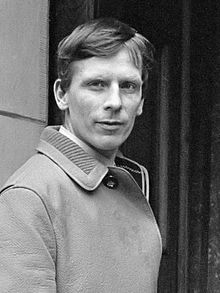White Bicycle Plan
Luud Schimmelpennink emerged on the Dutch social political scene as the main person behind the famous 1965 White Bicycle Plan in Amsterdam, whereby he and colleagues collected several hundred bikes, painted them white, and left them around the city to be freely used. This initiative, called the White Bicycle Plan, originally existed as one in a series of White Plans proposed in the street magazine and youth movement Provo. The Dutch Provos were, by the standards of the times, a radical group that thought to provoke the establishment with playful demonstrations.
On 22 February 1967 Schimmelpennink was elected to the Municipal Council of the City of Amsterdam, but was unable to get the needed political support for his White Bicycle Plan. However, the basic model that Schimmelpennink and his colleagues created became an inspiration and model for Community bicycle programs which today are gaining serious momentum in a growing number of European cities, including Helsinki, Copenhagen, Amsterdam, Lyons and Villeurbanne.
Latest White Bicycle system design summary
Schimmelpennink’s updated White Bicycle system is supported by a patented smart card technology intended to counter misuse. The integrated access, parking and control systems discourages theft, and the bicycles are immediately identifiable due to their unusual design. Registered users can access the White Bicycles in a network of unmanned parking lots around the city. Such parking lots are equipped with a main console and have racks that hold up to ten bikes. When a club member inserts a card with an embedded microchip into the console, they are asked to identify their final destination and at that time book the use of a bicycle for thirty minutes. The central computer identifies the user and makes a reservation for them at a free parking slot near their indicated destination point. The cyclist then has half an hour to get from point A to point B and deposit the bike as programmed. This is the basic structure of the Lyons bicycle project and others that have come on line in the last few years. Schimmelpennink has freely contributed his knowledge to such initiatives.

Utility cycling encompasses any cycling done simply as a means of transport rather than as a sport or leisure activity. It is the original and most common type of cycling in the world.

A bicycle-sharing system, bike share program, public bicycle scheme, or public bike share (PBS) scheme, is a shared transport service in which bicycles are made available for shared use to individuals on a short-term basis for a price or free. Many bike share systems allow people to borrow a bike from a "dock" and return it at another dock belonging to the same system. Docks are special bike racks that lock the bike, and only release it by computer control. The user enters payment information, and the computer unlocks a bike. The user returns the bike by placing it in the dock, which locks it in place. Other systems are dockless.

Provo was a Dutch counterculture movement in the mid-1960s that focused on provoking violent responses from authorities using non-violent bait. It was preceded by the nozem movement and followed by the hippie movement. Provo was founded, on 25 May 1965, by Robert Jasper Grootveld, an anti-smoking activist, and the anarchists Roel van Duijn and Rob Stolk. The term was used for the movement as a whole and for individual members. Provo was officially disbanded on 13 May 1967.

The car-free movement is a broad, informal, emergent network of individuals and organizations, including social activists, urban planners, transportation engineers, environmentalists and others, brought together by a shared belief that large and/or high-speed motorized vehicles are too dominant in most modern cities. The goal of the movement is to create places where motorized vehicle use is greatly reduced or eliminated, by converting road and parking space to other public uses and rebuilding compact urban environments where most destinations are within easy reach by other means, including walking, cycling, public transport, personal transporters, and mobility as a service.
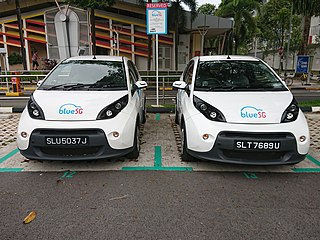
Carsharing or car sharing or car clubs (UK) is a model of car rental where people rent cars for short periods of time, often by the hour. It differs from traditional car rental in that the owners of the cars are often private individuals themselves, and the carsharing facilitator is generally distinct from the car owner. Carsharing is part of a larger trend of shared mobility.
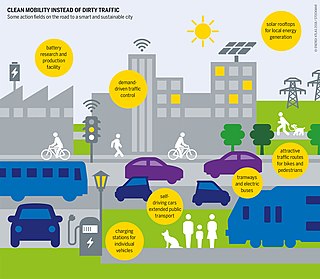
Sustainable transport refers to ways of transportation that are sustainable in terms of their social and environmental impacts. Components for evaluating sustainability include the particular vehicles used for road, water or air transport; the source of energy; and the infrastructure used to accommodate the transport. Transport operations and logistics as well as transit-oriented development are also involved in evaluation. Transportation sustainability is largely being measured by transportation system effectiveness and efficiency as well as the environmental and climate impacts of the system. Transport systems have significant impacts on the environment, accounting for between 20% and 25% of world energy consumption and carbon dioxide emissions. The majority of the emissions, almost 97%, came from direct burning of fossil fuels. Greenhouse gas emissions from transport are increasing at a faster rate than any other energy using sector. Road transport is also a major contributor to local air pollution and smog.

Cycling in Melbourne, the capital city of Victoria, Australia, is enhanced by the city's relatively flat topography and generally mild climate. The city has an active cycling culture for commuting, recreation, fitness and sport, and the metropolitan area has an extensive network of off-road bicycle paths, as well as designated bicycle lanes on many streets.

Transportation Alternatives is a non-profit organization in New York City which works to change New York City's transportation priorities to encourage and increase non-polluting, quiet, city-friendly travel and decrease automobile use. TransAlt seeks a transportation system based on a "Green Transportation Hierarchy" giving preference to modes of travel based on their relative benefits and costs to society. To achieve these goals, T.A. works in five areas: Cycling, Walking and Traffic Calming, Car-Free Parks, Safe Streets and Sustainable Transportation. Promotional activities include large group bicycle rides.
Francis Eric Knight Britton was an American political scientist and sustainability activist who has lived and worked in Paris, France, since 1969. As the main convenor of The Commons: Open Society Sustainability Initiative and its various networks, he is well known for promoting integrated public transport, carsharing and bike sharing.
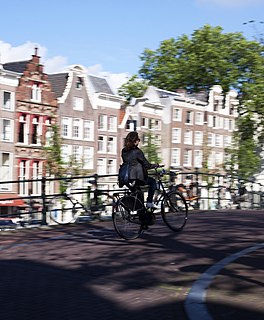
Cycling is a common mode of transport in the Netherlands, with 36% of Dutch people listing the bicycle as their most frequent way of getting around on a typical day, as opposed to the car (45%) and public transport (11%). Cycling has a modal share of 27% of all trips nationwide. In cities this is even higher, such as Amsterdam which has 38%, and Zwolle 46%. This high frequency of bicycle travel is enabled by excellent cycling infrastructure such as cycle paths, cycle tracks, protected intersections, ample bicycle parking and by making cycling routes shorter and more direct than car routes.

The Witkar was one of the first technology-based carsharing projects in the world. It is the invention of Dutch social inventor and politician Luud Schimmelpennink, an industrial designer and at the time Amsterdam city councillor. The project was opened by minister Irene Vorrink on 21 March 1974.

Vélib' was a large-scale public bicycle sharing system in Paris, France. Launched on 15 July 2007, the system encompassed around 14,500 bicycles and 1,400 bicycle stations, located across Paris and in some surrounding municipalities, with an average daily ridership of 85,811 in 2011. The name Vélib' is a portmanteau of the French words vélo ("bicycle") and liberté ("freedom").
Cycling in Sydney, New South Wales, Australia takes place for recreation, commuting and as a sport. Sydney has a hilly topography and so may require a slightly higher level of fitness from cyclists than flatter cities such as Melbourne and Canberra. Sydney depends heavily on motor vehicles where traffic and public transport operate at capacity. This means that cyclist are often competing with motorists for limited space on busier roads, and for limited government resources for expenditure on road infrastructure. In its favour, Sydney has a generally mild climate and there are active cycling groups.

A bicycle parking station, or bicycle garage, is a building or structure designed for use as a bicycle parking facility. Such a facility can be as simple as a lockable bike cage or shed or as complex as a purpose-built multi-level building: the common purpose is that they provide secure bicycle parking. Bicycle parking stations also go by names such as bike stations, bicycle centers and cycle centers, among many others.

Shared transport or shared mobility is a transportation system where travelers share a vehicle either simultaneously as a group or over time as personal rental, and in the process share the cost of the journey, thus creating a hybrid between private vehicle use and mass or public transport. It is a transportation strategy that allows users to access transportation services on an as-needed basis. Shared mobility is an umbrella term that encompasses a variety of transportation modes including carsharing, Bicycle-sharing systems, ridesharing companies, carpools, and microtransit.

The Institute for Transportation and Development Policy (ITDP) is a non-governmental non-profit organization that focuses on developing bus rapid transit (BRT) systems, promoting biking, walking, and non-motorized transport, and improving private bus operators margins. Other programs include parking reform, traffic demand management, and global climate and transport policy. According to its mission statement, ITDP is committed to "promoting sustainable and equitable transportation worldwide."

Kabouters were a Dutch anarchist group in the 1970s.
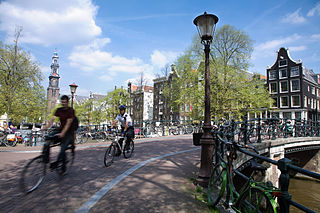
Amsterdam is well known as one of the most bicycle-friendly cities, with high levels of bicycle infrastructure, planning and funding, tourism — as well as high levels of bike theft, safety concerns and overcrowding in places.

Cycling infrastructure refers to all infrastructure permissible for use by cyclists, including the network of roads and streets used by motorists, except where cyclists are excluded, along with bikeways from which motor vehicles are excluded—including bike paths, bike lanes, cycle tracks, rail trails and, where permitted, sidewalks. Cycling infrastructure also includes amenities such as bike racks for parking, shelters, service centers and specialized traffic signs and signals. Cycling modal share is strongly associated with the size of local cycling infrastructure.
Ecovolis is a community based bike sharing program in Tirana, Albania, launched on March 22, 2011, from an environmental NGO called Social Stimulating Alternatives Program (PASS). The system is based on 6 bike stations, respectively staffed by two employees in two shifts. Ecovolis program has proven successful in significantly increasing bicycle use in Tirana.
